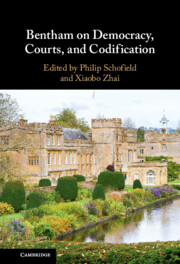Book contents
- Bentham on Democracy, Courts, and Codification
- Bentham on Democracy, Courts, and Codification
- Copyright page
- Contents
- Contributors
- Introduction
- Part I Democracy
- 1 Intellectual Aptitude and the General Interest in Bentham’s Democratic Thought
- 2 Bentham, Democracy, Free Government, and the Relationship between Rulers and Ruled
- 3 The Interests of Women in Bentham’s Late Constitutional Thought
- 4 Religion and Judgement in Bentham’s Political Thought
- 5 Organizing the Utilitarian State
- 6 Bentham on the Corruption of Democracy
- 7 The People’s ‘Greatest Misfortune’ and ‘All the Chance the People Have’
- Part II Law and the Courts
- Part III Codification
- Bibliography
- Index
4 - Religion and Judgement in Bentham’s Political Thought
from Part I - Democracy
Published online by Cambridge University Press: 25 August 2022
- Bentham on Democracy, Courts, and Codification
- Bentham on Democracy, Courts, and Codification
- Copyright page
- Contents
- Contributors
- Introduction
- Part I Democracy
- 1 Intellectual Aptitude and the General Interest in Bentham’s Democratic Thought
- 2 Bentham, Democracy, Free Government, and the Relationship between Rulers and Ruled
- 3 The Interests of Women in Bentham’s Late Constitutional Thought
- 4 Religion and Judgement in Bentham’s Political Thought
- 5 Organizing the Utilitarian State
- 6 Bentham on the Corruption of Democracy
- 7 The People’s ‘Greatest Misfortune’ and ‘All the Chance the People Have’
- Part II Law and the Courts
- Part III Codification
- Bibliography
- Index
Summary
One of the charges Bentham made against the Church of England was that it aimed at, and achieved to some degree, the ‘prostration of understanding and will’. The phrase was taken from a visitation sermon by Bishop Howley, in which he warned against the dangers of Unitarianism as a shelter for ‘infidelity’. Fortunately, in Howley’s view, the appeal was as yet confined to men of limited education who had not spent much thought on religion, or who, ‘loving rather to question than to learn, [had] approached the oracles of divine truth without that humble docility, that prostration of the understanding and will, which [were] indispensable to proficiency in Christian instruction’.
- Type
- Chapter
- Information
- Bentham on Democracy, Courts, and Codification , pp. 88 - 109Publisher: Cambridge University PressPrint publication year: 2022

